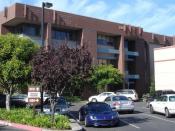The subject matter of this paper was first discussed in Alan Wolfe's book, "One Nation, After All". Alan Wolfe devoted this book entirely to the middle class public opinion on issues ranging from religion to homosexuality. He really tried to document and understand what middle class Americans care about, and what is important to them. The book first defined the middle class. "For many people around the world becoming American and being middle class are the same thing," (Wolfe, 1). In the book, the middle class is described as the American dream. Most Americans wish to classify themselves in this middle class. Middle class Americans are thought of as grounded, hardworking, and sensible people, especially by conservatives. According to Wolfe the conservative define the middle class as the "moral class." (Wolfe, 8-10). Where as the liberals, consider the middle class to be "hostile" to those different than them, such as minorities.
He then discussed that both sides believe that middle class America is split and currently involved in a culture war. Wolfe set out to see if this was true. He focused his study to areas where the median income was below $100,000 and above $45,000. He choose 8 different communities: Brookline, Massachusetts, Medford, Massachusetts, Southeast Dekalb County, Georgia, Cobb County, Georgia, Broken Arrow, Oklahoma, Sand Springs, Oklahoma, East Lake, California, and Ranch Bernardo, California.
One of the most important things that Wolfe discovered was what he called "quiet faith." A majority of the respondents has some sort of religious faith, but very few of them were what we would call "absolutists." Wolfe discovered that middle class Americans were actually slow to judge, slow to call another person's religion wrong, and preferred to worship or not worship in a quiet, private way. One way that American middle class is still slow to accept is homosexuality. Surprisingly the American middle class was unified in their distaste for homosexuality, although, they agreed tolerance was important.
Wolfe, also looked into why middle class Americans choose the suburbs. According to Wolfe many middle class black people saw the suburbs as a clear choice from the city; where as the white respondents never even questioned it. It was established they would live in the suburbs. (Wolfe, 190-191) Children are a big reason middle class Americans choose the suburbs over the city. They don't see the city as a place structured for children, and feel they are left with no real options. Middle class America is torn on the issues of welfare and the poor. They believe they have an obligation to help those less fortunate, but are unhappy with the way the system currently works. Welfare basically goes against the grain of what middle class America stands for. They believe in working hard, and earning what one is given, but they also believe in a second chance. Race was also a topic of discussion in Wolfe's book. Middle class America was no longer necessarily fleeing different races by living in the suburbs. The outlook of race has changed in American middle class, and though some definite problems still remain, it was not quite the mess suspected by some experts.
Middle class America agreed that Americans have become more selfish. Wolfe defined a "balanced Capitalism" is what most Americans would like to see. (Wolfe, 234) They are tired of corporate greed, but no where near ready to give up capitalism for socialism found in Europe. Politically, middle class American's are distrustful of the government. They believe politicians are disconnected from them, and do not care about what they care about. They wish less money was spent on campaigns, and less empty promises were made. They are highly suspect of politicians, and although they are very negative about the outlook of American politics, they are very positive about their own individual future.


